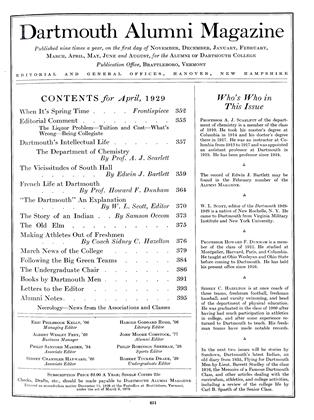The Medical Pocket Quarterly recently carried an article discussing whether or not Daniel Webster and Rufus Choate planned to enter the medical career. Both statesmen entered the Dartmouth Medical School in their senior year, but did not graduate. And—but here is the story:
The "fork in the road"—the nearest thing man has ever discovered to destiny—causes one man to break away from his plans and become a banker instead of a barber, another to jump down off his truck and become a North Pole explorer.
There is always the occasion for wonderment at what the man's career might have been, had he—or Fate—elected to continue along the original plans.
Daniel Webster, senator, statesman, and American extraordinary, apparently intended at one time to become a physician. He entered Dartmouth College, which was established in 1769, as a member of the academic class of 1801.
When Webster was a senior in the College, that is in the year 1800, he registered in Dartmouth Medical School (founded in 1797, and to-day the fourth oldest medical school in the country). The General Catalogue of Dartmouth College indicates this fact. But he did not graduate as a Doctor of Medicine. Mr. Webster received the degree of Bachelor of Arts from Dartmouth in 1801, and his registration in the medical school during his senior year in the college is the sole testimony Dartmouth has as to a possible medical career.
In 1815, Rufus Choate, afterward U. S. senator and the greatest constitutional lawyer of all time, entered Dartmouth College in the class of 1819. Following the example of Webster, whose contemporary he was in public life, Choate also registered in Dartmouth Medical School in his Senior year, but neither did he take a medical degree. The degree of Bachelor of Arts was conferred upon him in 1819, but nothing more is known as to the reason which prompted him to take a year in the medical school.
 View Full Issue
View Full Issue
More From This Issue
-
 Class Notes
Class NotesCLASS OF 1923
April 1929 By Truman T. Metzel, "Charlie Chadbourne" -
 Article
ArticleThe Vicissitudes of South Hall
April 1929 By Edwin J. Bartlett -
 Lettter from the Editor
Lettter from the EditorEditorial Comment
April 1929 -
 Article
ArticleFrench Life at Dartmouth
April 1929 By Howard F. Dunham -
 Class Notes
Class NotesCLASS OF 1899
April 1929 By Louis P. Benezet -
 Article
Article"The Dartmouth," An Explanation
April 1929 By W. L. Scott, Editor
Article
-
 Article
ArticleALUMNI RETURN TO HANOVER FOR FEBRUARY 22
April, 1923 -
 Article
ArticlePrize-Winning Editor
October 1951 -
 Article
Article'42 Class Giving Sets Record
JULY 1967 -
 Article
ArticleFace to Watch
Sept/Oct 2002 -
 Article
ArticleAn Honor for the Editor
December 1989 By Carl L.N. Erdman '37 -
 Article
ArticleJohn Poor (Addenda)
May 1935 By The Editors

